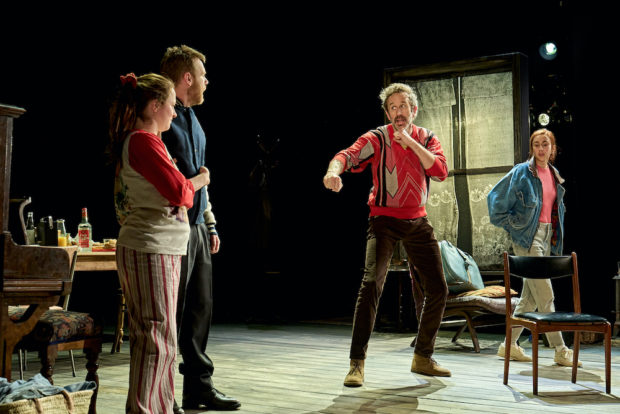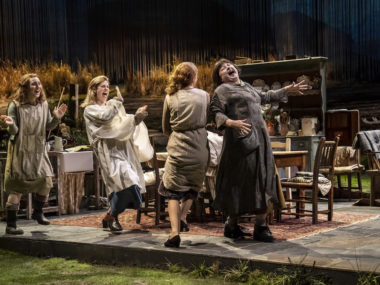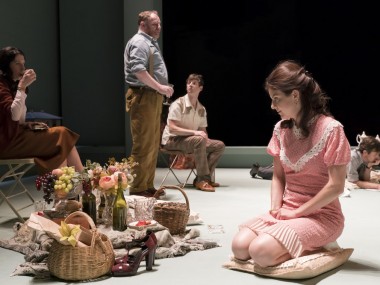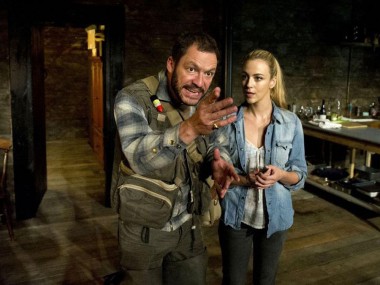The Brightening Air, Old Vic
Monday 28th April 2025

Theatre needs mystery. In the darkened auditorium, with a crowd of strangers sharing your experience, it is possible to believe in anything you see on the stage: ghosts, miracles and magic. Few playwrights have been as good as engaging with such mystical aspects of life than Conor McPherson, whose previous plays include The Weir, Shining City and The Veil. For his latest, The Brightening Air, inspired by working on a version of Anton Chekhov’s Uncle Vanya in 2020, he has turned to WB Yeats for the title, and to Irish folk lore for the atmosphere.
The phrase “brightening air” comes from Yeats’s 1899 poem “The Song of Wandering Aengus”, and suggests the longing of a man in love, and the split between illusion and reality, between the dream and the mundane. It is a fitting title for this family drama, which is set in a large country house in Ireland in 1981, a time indicated by an anecdote about hunger striker Bobby Sands, the lack of digital devices and the general run-down nature of the house and family: this is Ireland before the Celtic Tiger economic boom transformed the lives of the inhabitants of the country.
In this decaying mansion live Stephen, in his early forties and looking after his younger sister Billie, who finds it impossible to cope with life and has a mixture of autism and learning difficulties. They are visited by their energetic older brother Dermot, his disappointed wife Lydia and new girlfriend Freya, who is a teenager. He has designs on the family home and Lydia is looking for a magic potion to bewitch her husband and make him love her again. Then there is their blind uncle, Father Pierre, a defrocked priest, and his carer Elizabeth. A local farm worker, Brendan, completes the cast of characters.
From its wonderfully dramatic opening music, as filigree screens show shadow play from the half-remembered past, and suggest numinosity in the everyday present, The Brightening Air is a play about character and family. Stephen and Billie are both unhappy, having adapted to living a half life in which their chickens are killed by foxes, and there is never any money around. Billie has had more than one road accident, after wandering off, and Brendan, who is attracted to her, helps by looking after their cattle. There’s a sense that this stable if depressingly cold life is also inflected by wonder: a magic well, railway timetables that suggest adventures, and music, sweet, sweet music.
By contrast with this stasis, Dermot is a powerful force of action. He has work, children he neglects, and a taste for drink as well as an eye for women. Lydia, his partly estranged wife, is practical despite her belief in miracles, and angry at his affair with Freya, who is not only a rival but also has witch-like powers. Pierre the priest is a heretic, who preaches the satanic qualities of God, and has been punished by the Catholic church. Despite his blindness, and old age, he has ambitions to create a religious house, while his long-suffering housekeeper Elizabeth has some of best lines about marriage, celibacy and pleasure.
As a nod to Chekhov, this is a four-act drama in which the first two conjure up a beautifully atmospheric sense of living family tensions, always present, yet always deflected too. Subtext rules; eccentricity pops in occasionally. There’s a real linguistic music which fascinates and beguiles. In the second half, however, the promise of the first gets lost in a whole series of revelations, complications and meanderings. New ideas jump onto the stage, do a quick pirouette — then disappear in a flash. Bizarre moments follow puzzling speeches. Chekhov turns into melodrama, appreciation into frustration.
And yet. And yet. McPherson’s play is always watchable, always interesting, and — at a time when many playwrights simply repeat banalities — he gives us complex characters and he does have fascinating things to say. In addition to the Chekhovian sense that we are attracted to, in love with, the wrong people, there is a powerful feeling that we can take control over our own lives, even in circumstances not of our choosing. A buzz of freedom and wonder is audible on stage and off, while the examples of eccentric speeches and humorous incidents are delightful. In short, there is a miracle, a monologue and a mystical vision to be savored.
I’m never entirely comfortable with writers directing their own work, and McPherson’s play is occasionally better on the page than on the stage: there’s a bit too much pointless moving of tables and chairs. Enjoyable as this evening is, I’m pretty sure that a dramaturg could have tightened up some of the episodes. Still, the acting is first rate: Chris O’Dowd’s Dermot is a strong presence, attractive and repulsive in equal parts, while his siblings Stephen (Brian Gleeson) and Billie (Rosie Sheehy) are perfect. Seán McGinley lends Father Pierre both battered glory and baleful grace, and his monologue about blasphemous religious belief is a highpoint.
Of the rest, I really like Hannah Morrish’s pained and painful Lydia, Derbhle Crotty’s practical and powerful Elizabeth, and Aisling Kearns’s relaxed and reflective Freya. If Brendan is the least essential member of the household, Eimhin Fitzgerald Doherty still gives him ample life. With Rae Smith’s ghostly yet grounded design, helped by Mark Henderson’s lighting and Gregory Clarke’s sound, which create a real feel of the uncanny, The Brightening Air is both elegiacally written and poetically resonant. Its implicit messages of resistance and resilience, it sense of hope for the future and acknowledgement of the pains of poverty and the demons of drunkenness are compelling to watch even if perfection is here as elusive as happiness.
This review first appeared on The Theatre Times
- The Brightening Air is at the Old Vic until 14 June.




